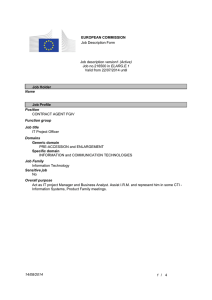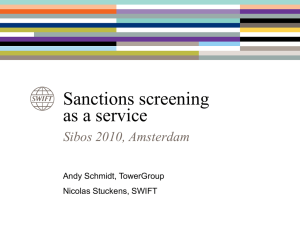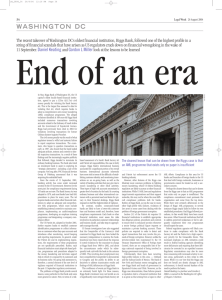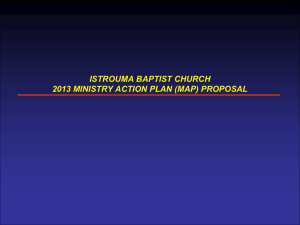The Foreign Missions Business at Bank of America
advertisement
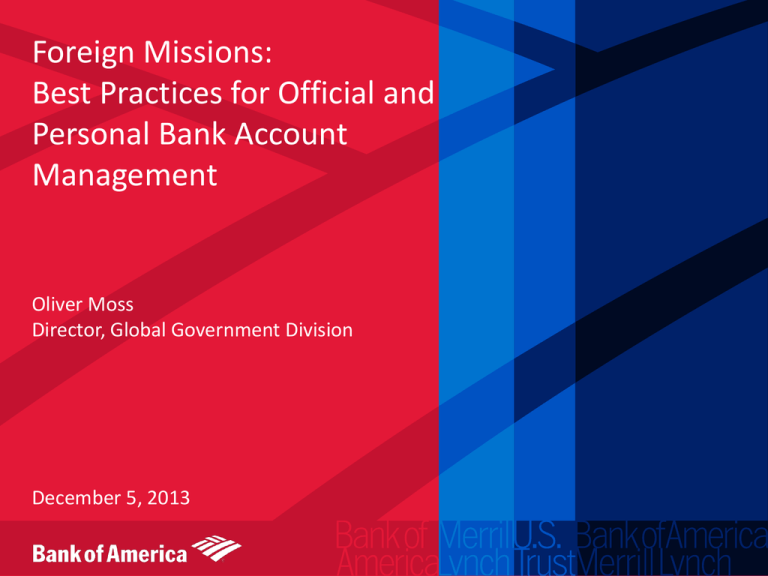
Foreign Missions: Best Practices for Official and Personal Bank Account Management Oliver Moss Director, Global Government Division December 5, 2013 Serving Foreign Missions The Foreign Missions Business at Bank of America: • Within the United States and abroad, the Bank serves the Diplomatic Missions from around the world • Bank of America is fully committed to providing banking services to Diplomatic Missions throughout the United States and globally • Official client relationships with diplomatic missions are managed centrally by the Global Government Division • Personal accounts are managed by the bank’s Consumer Banking group Products and Services for Official Accounts • Cash Management and Depository Services - Demand deposit/checking accounts - Payments: Checks, Wire Transfers, ACH, Debit card, Credit Card (subject to credit approval) - Receipts: Collections of consular fees via check, cash, money order, credit and debit cards - Information Reporting: Electronic access to information • Credit - Credit cards (subject to credit approval) - Credit facilities: Letters of credit (subject to credit approval) • Foreign Exchange • Investments and savings accounts Products and Services for Personal Accounts • Checking and Savings accounts • Payment services: wire transfers, checks, debit cards • Credit products: Automobile Loans and Credit cards (subject to credit approval and an official banking relationship with the embassy/consulate/mission) 2 Foreign Missions – Current Regulatory Environment Some Basics • The Bank Secrecy Act (BSA) requires that Banks understand the nature of our customers’ business, including expected transactions, and monitor related transactions for potentially unusual activity. • Banks must file a Currency Transaction Report (CTR) for each transaction in currency greater than $10,000. A transaction may include multiple transactions totaling more than $10,000 during any one business day if they are by or on behalf of the same person/entity. • Failure to follow U.S. Banking laws and/or the appearance of account activity that is not consistent with the purpose of the account, may result in account closure. Background - Riggs Bank and HSBC • July 2004 : Riggs Bank was the subject of a case study published by the US Senate Permanent Sub-committee on Investigations (PSI) titled, “Money Laundering and Foreign Corruption: Enforcement and Effectiveness of the Patriot Act.” - Highlighted activity centered on accounts of foreign governments, embassies and foreign political figures citing gross disregard of Riggs’ AML obligations and failure by US regulators to enforce the regulations. - Riggs was subsequently fined $25 million for failing to meet the requirements of a related Consent Order issued in July 2003. • July 2012: The U.S. Senate PSI issued a Case Study titled, “U.S. Vulnerabilities to Money Laundering, Drugs, and Terrorist Financing: HSBC Case History” citing repeated AML Program deficiencies across multiple businesses and Regulator supervisory failures extending over multiple years. HSBC fined $1.9 Billion. Evolving US Regulatory Posture and Requirements • Regulators now consider bank AML deficiencies as a matter of safety and soundness. • Regulatory expectations require that banks demonstrate stronger AML controls , especially for customer segments and products that are perceived to carry heightened AML risks. • Customer segments and products with elevated money laundering risk will receive more frequent, detailed regulatory oversight. • US Regulators have shown less tolerance for AML deficiencies as evidenced by the high number of public enforcement actions over the past several years. Impacts to Foreign Missions • Embassies, Consulates, and Foreign Missions are considered by US Bank Regulators to carry an elevated risk of Money Laundering. • Banks are being forced to make difficult risk/return trade-offs, resulting in some banks exiting certain sectors with higher AML risks. • Today, there are fewer banks serving Foreign Missions within the U.S. due to increased Regulatory expectations and associated costs. • Banks now gather more information at on-boarding, must understand the purpose of the accounts, require greater transparency in transactions, and have less tolerance for customers that exhibit unusual activity or behaviors. 3 Foreign Missions/Personal Accounts – Best Practices Best Practices – Missions • • • • • • • Anticipate questions about your banking practices and work with Banks in a transparent, non-evasive manner. Notify your Bank of any uncustomary transactions such as: large wires in/out, large cash requests, cash payments to individuals or other entities, or any other transaction activity that is out of the ordinary. Avoid paying with cash – convert to other methods of payments/receipts such as credit or debit cards, wires, or other electronic payment methods. Do not send or accept wires from other foreign governments without prior notification as to size, purpose and rationale. Understand the requirements of Currency Transaction Reporting. Attempts to avoid completing CTRs by depositing smaller amounts is called structuring and is against the law. Know what cash structuring is and avoid doing so. Ensure the Mission has at least two account signatories, reconciles accounts continuously (at least monthly), exercises good financial controls, and audits your Bank activity at least annually. Missions should notify their Bank immediately if any unusual or suspicious activity is detected. Best Practices – Personal Accounts • • • • • Proper account management is expected and individuals should reconcile accounts at least monthly. Pay your personal expenses by check or through online banking – avoid paying cash for customary expenses. Avoid overdrafts - if you need credit, ask the Bank about options, including acquiring a Credit Card, or use a savings account for overdraft protection. Ensure you are set up for your bank’s online banking service. Personal accounts are for your personal activity – do not conduct Mission business, any other non-Mission business, or business for other persons through your Personal accounts. If you are repatriating your earnings or sending money to your family, electronic methods are preferred citing clear purpose and beneficiaries. 4 Foreign Missions: Bank of America Contacts Bank of America Global Government Division 730 15th Street, NW DC1-701-07-08 Washington, DC 20005 Oliver Moss Executive Director & GGD oliver.m.moss@baml.com 202.442.7472 Fax: 202-442-7503 Joe Caracuel Director, Client Manager joseph.s.caracuel@baml.com 202.442.7475 646.855.1062 Rebecca Han Vice President, Client Manager rebecca.han@baml.com 202.442.7496 Gisela Pazmino Assistant Vice President, Client Manager gisela.pazmino@baml.com 202.442.7494 Brahim Rawi Vice President, Client Manager Brahim.rawi@baml.com 202.442.7495 5 Appendix: FFIEC Requirements for Banking Foreign Missions Bank Secrecy Act Anti-Money Laundering Examination Manual Embassy and Foreign Consulate Accounts – Risk Factors Banks conducting business with foreign embassies or consulates should assess and understand the potential risks of these accounts and should develop appropriate policies, procedures, and processes. Embassy or foreign consulate accounts may pose a higher risk in the following circumstances: • Accounts are from countries that have been designated as higher risk. • Substantial currency transactions take place in the accounts. • Account activity is not consistent with the purpose of the account (e.g., pouch activity or payable upon proper identification transactions). • Accounts directly fund personal expenses of foreign nationals without appropriate controls, including, but not limited to, expenses for college students. • Official embassy business is conducted through personal accounts. Embassy and Foreign Consulate Accounts – Risk Mitigation Banks should obtain comprehensive due diligence information on embassy and foreign consulate account relationships. For private banking accounts for non-U.S. persons specifically, banks must obtain due diligence information as required by 31 CFR 103.178.249 The bank’s due diligence related to embassy and foreign consulate account relationships should be commensurate with the risk levels presented. In addition, banks are expected to establish policies, procedures, and processes that provide for greater scrutiny and monitoring of all embassy and foreign consulate account relationships. Management should fully understand the purpose of the account and the expected volume and nature of account activity. Ongoing monitoring of embassy and foreign consulate account relationships is critical to ensuring that the account relationships are being used as anticipated. 6
